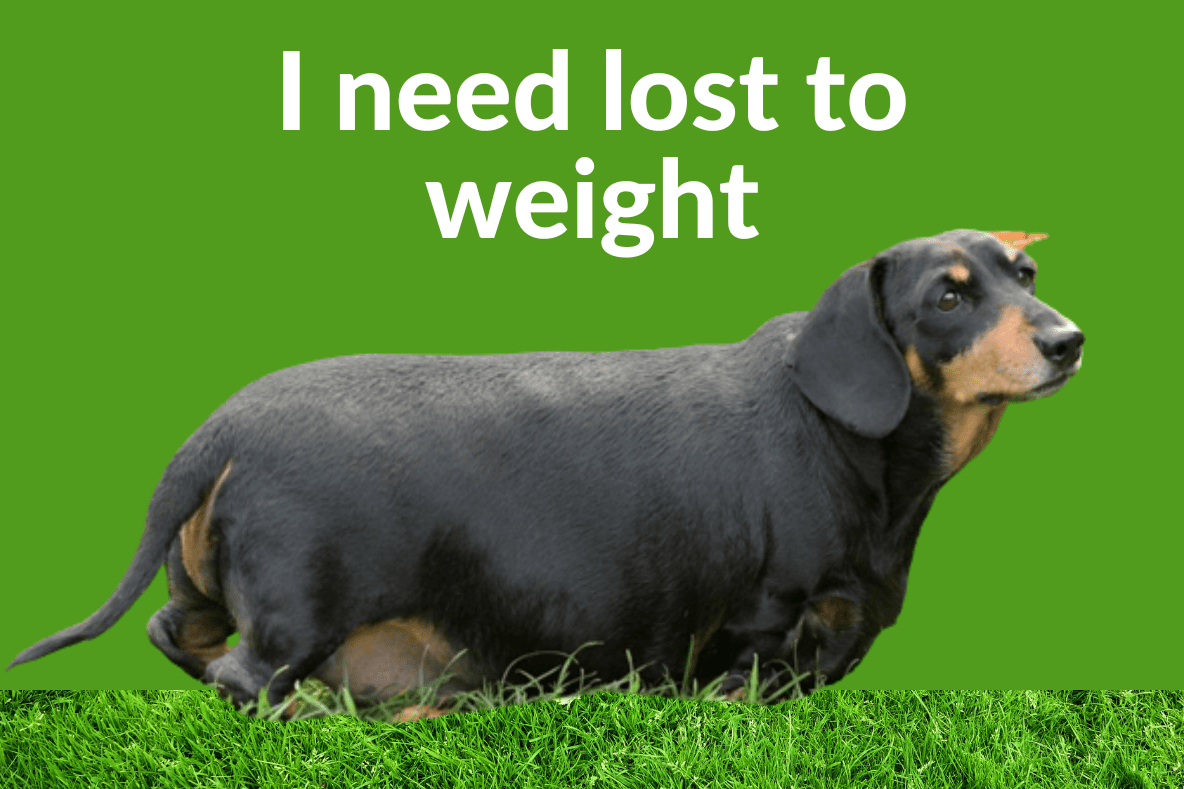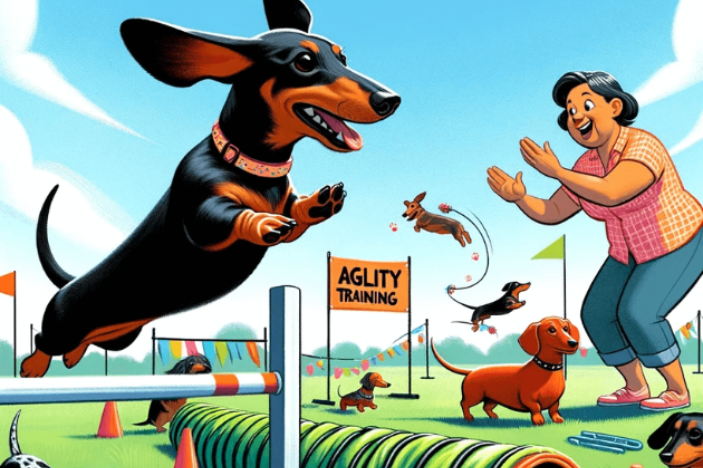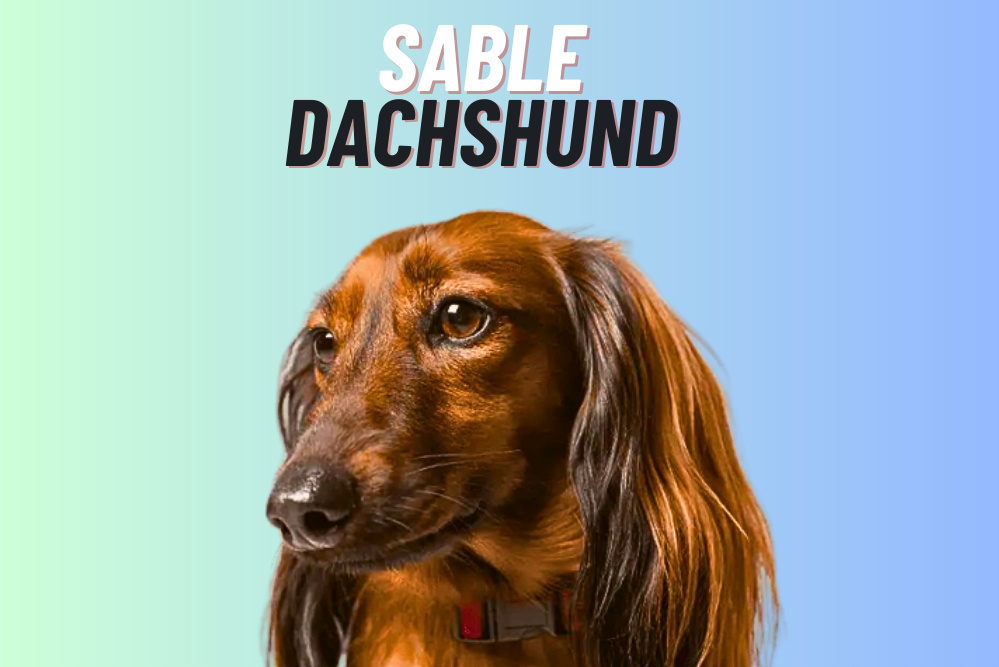Dachshunds are prone to becoming overweight or obese, especially if they don’t get enough exercise or are overfed. Obesity can lead to various health problems in dogs, including diabetes, heart disease, and joint problems.
To keep your Dachshund at a healthy weight, it’s essential to provide them with a balanced diet that meets their nutritional needs and monitor their food intake. You should also ensure that they get enough exercise every day, which can include walks, playtime, and interactive games.
If you’re concerned about your Dachshund’s weight, it’s best to consult with a veterinarian. They can provide guidance on proper nutrition and exercise for your dog’s specific needs and help you develop a plan to get your Dachshund back to a healthy weight
Remove Dachshund Fat.
There are some general tips for managing a dog’s weight that may help reduce excess body fat.
- Firstly, it is important to ensure that your dachshund is getting enough exercise. Regular walks, playtime, and other physical activities can help burn calories and improve overall fitness.
- Secondly, it is important to monitor your dachshund’s food intake and adjust their diet as needed. Avoid feeding your dachshund table scraps or high-calorie treats, and ensure that their regular meals are nutritionally balanced and appropriate for their age, weight, and activity level.
Additionally, consider consulting with a veterinarian or animal nutritionist for personalized advice and recommendations. They can help you create a tailored weight loss plan for your dachshund and provide guidance on safe and effective ways to manage their weight
How to Stay Healthy When Eating a New Diet for the Dachshund.
If you are introducing a new diet for your Dachshund, it is important to ensure that their nutritional needs are met in order to maintain their overall health. Here are some tips to help your Dachshund stay healthy while eating a new diet:
- Consult with a veterinarian: Before starting a new diet, it’s important to consult with a veterinarian to make sure that the diet is appropriate for your Dachshund and that they are getting all the necessary nutrients.
- Gradual transition: Gradually transition your Dachshund to the new diet over a period of one to two weeks to avoid digestive upset.
- Monitor portion sizes: Monitor your Dachshund’s portion sizes and adjust as necessary to maintain a healthy weight.
- Provide fresh water: Make sure your Dachshund always has access to fresh, clean water.
- Supplement with vitamins and minerals: Consider supplementing your Dachshund’s diet with vitamins and minerals to ensure they are getting all the necessary nutrients.
- Regular exercise: Regular exercise is important to maintain your Dachshund’s overall health, so make sure they are getting enough physical activity.
- Monitor for any signs of health problems: Be vigilant for any signs of health problems, such as lethargy, vomiting, diarrhea, or changes in appetite or behavior. If you notice any of these symptoms, contact your veterinarian immediately
The Dachshund’s digestive system
The Dachshund’s digestive system is similar to that of other dogs. It is a complex system that involves the ingestion, breakdown, and absorption of food. Like all dogs, Dachshunds are carnivores, meaning that their digestive system is designed to process meat and other animal products.
One thing to note is that Dachshunds, like many small breed dogs, are prone to certain digestive issues such as pancreatitis and gastroenteritis.
It’s important to feed them a balanced diet that is appropriate for their size and to monitor their eating habits to prevent overeating or consuming foods that can be harmful to their digestive system. Regular veterinary check-ups can also help to identify and address any potential digestive issues early on
The Dachshund’s stomach
Due to their unique stomach structure, Dachshunds can be prone to certain health issues related to their digestive system. For example, they may be more susceptible to gastroesophageal reflux disease (GERD) and bloat.
It’s important to feed Dachshunds smaller, more frequent meals and to avoid overfeeding them to help prevent these issues. Regular exercise and maintaining a healthy weight can also help keep their digestive system functioning properly
One common cause
One common cause of obesity in dogs is an over-the-counter medication called furosemide (Champion). This medication can lead to weight gain because it causes the body to store more calories rather than burn them off like normal during meals.
If you have any concerns about whether your Dachshund has been receiving furosemide treatment, ask his vet if he has any special dietary restrictions that would impact his weight problem.
A final important
A final important consideration when it comes to keeping your Dachshund healthy is to be sure he’s getting enough food and water. A healthy diet includes plenty of fresh vegetables, fruits, and whole grains, as well as fiber-rich foods like whole-grain pasta or bread. And if your Dachshund needs water, make sure he gets at least 12 cups per day recommended amount for all dogs, and that his drinking water is high quality.
Find out what kind of food you should feed your dachshund.
There are three types of diets that you should provide to your dachshund: a balanced diet, an inactive diet, or a high-fat diet. A balanced diet for a dachshund is one that is made up of all foods that are healthy for her, including protein, carbohydrates, fats, and vitamins and minerals.
An inactive diet for a dachshund is one in which your dog does not get any exercise at all. A high-fat diet for a dachshund is one in which she consumes too much fat cholesterol and not enough carbohydrates or proteins.
Tips for Feeding Your Dachshund a Healthy Diet.
A proper diet for a dachshund should include plenty of fresh vegetables, natural products, and whole grains. You can also feed your dog junk food only if it is specifically designed for dogs, as many of the common types of kibble used by humans are not good for dogs. Be sure to give your pup a balanced diet that includes both meat and plant-based foods to ensure his or her health and well-being.
Do Dachshunds get fat easily?
Dachshunds are a breed that is prone to becoming overweight or obese, especially if they are overfed or do not get enough exercise. Due to their long body and short legs, they can have a slower metabolism and may require less food than other breeds of similar size.
Additionally, dachshunds have a tendency to beg for food and may have a voracious appetite, which can lead to weight gain if not managed properly.
It is important to monitor a dachshund’s food intake and provide them with regular exercise to prevent them from becoming overweight.
Feeding them a balanced diet that is appropriate for their age, weight, and activity level can also help keep them at a healthy weight.
If you are concerned about your dachshund’s weight, it is best to consult with a veterinarian who can provide guidance on proper nutrition and exercise for your dog.
Conclusion
In conclusion, managing a Dachshund’s weight and preventing obesity is crucial for their overall health and well-being. Being overweight or obese can lead to various health issues such as joint problems, diabetes, and heart disease.
Dachshunds are a breed that is prone to gaining weight easily, so it’s important to monitor their food intake and ensure they receive enough exercise.
Consultation with a veterinarian can help determine an appropriate diet and exercise plan for your Dachshund to maintain a healthy weight. By taking proactive steps to manage a Dachshund’s weight, you can help ensure that they live a happy and healthy life.




